#microsoft patent
Explore tagged Tumblr posts
Text
WHO says mpox outbreak in Africa is international public health emergency
(Source).






#agenda 21#agenda 2030#event 201#id2020#covid 1984#plandemic#cashless society#cryptocurrency#one world government#the great reset#nwo#new world order#illuminati#mpox#monkeypox#who#world health organization#news#clot shot#jab#nanotechnology#microsoft#patent#do not comply
5 notes
·
View notes
Text
Digital Science announces new AI patent study: IBM leads Google and Microsoft race to next AI generation
Major players are vying for top position as Generative AI drives technology patent grants up by 16% in the last five years and applications by 31%, according to a new patent study on trends in artificial intelligence by Digital Science company IFI CLAIMS U.S. commercial giants IBM, Google and Microsoft lead the way as the companies with the most patent applications in Generative AI (GenAI), with…
2 notes
·
View notes
Text
Microsoft Xbox, PlayStation DualSense’e rakip oluyor!
New Post has been published on https://lefkosa.com.tr/microsoft-xbox-playstation-dualsensee-rakip-oluyor-29922/
Microsoft Xbox, PlayStation DualSense’e rakip oluyor!

Oyun dünyasının devlerinden Microsoft, Xbox kontrolcülerine daha gelişmiş dokunsal geri bildirim özellikleri getirmek için kolları sıvamış üzere görünüyor. Şirketin yeni bir patent başvurusu, bu alanda ihtilal yaratabilecek bir teknolojiyi işaret …
https://lefkosa.com.tr/microsoft-xbox-playstation-dualsensee-rakip-oluyor-29922/ --------
0 notes
Text
Microsoft'un Yeni Katlanabilir Telefon Patenti
Microsoft’un katlanabilir ekranlı bir telefon üzerinde çalıştığı, aldığı yeni patentle gün yüzüne çıktı. ABD Patent ve Marka Ofisi’ne bu yılın başlarında yapılan başvuru, ekim ayında yayınlandı ve bu patent, Samsung ve Huawei gibi teknoloji devlerinin yatay olarak katlanan telefon tasarımlarına benzerlik gösteriyor. Özellikle dikkat çeken bir nokta, Microsoft’un patentinde yer alan telefonun iç…
#ekran tasarımı#Huawei#katlanabilir telefon#Microsoft#Patent#Pixel Fold#Samsung#Surface Duo 2#teknoloji
0 notes
Text

So with all the stuff going on around Nintendo Vs Pocketpair I feel like people are missing the point of what's going on.
And this article actually finally brings up the biggest point: Nintendo has 1000s of patents and chooses not to enforce them all on everyone.
The idea that, quoting the article and Serkan Toto, "Nintendo's sweeping list of patents means it likely "could have sued half of the gaming industry back in 2017," …so like WHY NOT DO THAT?
There's a million reasons to not do it for Nintendo but TLDR is it's just bad business for them to do so.
The real take away is -what has PocketPair/Palworld done- that has brought out Nintendo to start enforcing these things in this particular situation?
A lot if you pay attention to PocketPair/Palworld's marketing and social presence. They threw rocks at Nintendo, so Nintendo is finally pushing back.
Now I'm not going to fully go to bat for Nintendo and say "they are a good company" because there's no such thing truly…
But in most cases with Nintendo, they C&D folks multiple times before even thinking of escalating anything to real legal trouble. Which is kinder than most companies.
The final thought of the article says that Nintendo may feel "threatened" by PalWorld but… I don't buy it.
Pokemon is THE highest grossing franchise in the world… ever… of all time. It's total revenue is around $100 BILLION with a B.
PalWorld, even at it's height, didn't even come close.
The aspects that I think Nintendo decided to act upon in their mind for this is the brazen bold rudeness and shit talking that happened on social media/marketing with PocketPair/Palworld.
PLUS the fact that Pokemon fans were also quick to be like "bruh, even if this isn't stolen it's obviously design lifted" for a lot of Palworld's Pals.
Add in the fact that both Microsoft and now Sony have pulled PalWorld onto their platforms… Nintendo is going to notice and get mad.
The truth is that PocketPair is an indie dev… with major AAA studios behind it now in a lot of ways. Which actually hurts PocketPair in a sense.
Nintendo tends to ignore indie stuff and has actually collabed with many indie studios before in major ways, so they aren't anti-indie.
Nintendo is OLD SCHOOL and expects a little bit of respect.
Nintendo has not taken action against pretty much any of the other true new Tiny Critter Collecting Indie IP that have popped up, a lot of them are ON Nintendo platforms and have had Nintendo feature them in directs…
But PocketPair threw rocks. Nintendo easily saw this as disrespect, but could be ignored.
What CAN'T be is the outcry from their own fanbase to "look into things" with PalWorld to see what, if anything, was lifted from Nintendo directly.
And Nintendo did. They took over a year to look into it.
This isn't Nintendo doing a knee jerk reaction, they went over things and took their time to research what PalWorld and PocketPair were doing.
Nintendo isn't stupid. They don't pick fights for no reason.
Regardless of if you LIKE Nintendo, or your feelings on a big company taking on a little company… Nintendo is very likely on the right side of business, IP, and patent law here.
Nintendo -losing- here would be, actually, really bad for small folks more than big guys in the long run.
Adding in the fact that PocketPair launched a generative Ai art game on top of all that…
This feel like, yes, Nintendo is flexing in a lot of ways but… they chose who to flex on and not to flex on -everyone-… so there seems to be a solid reason as to -why-.
Again the real take away is that IF Nintendo could have sued half of the gaming industry (as of 2017) with all the patents they have … why didn't they and WHY are they choosing to sue PocketPair/Palworld -now-?
Because that's more important than anything else.
689 notes
·
View notes
Text
An adversarial iMessage client for Android
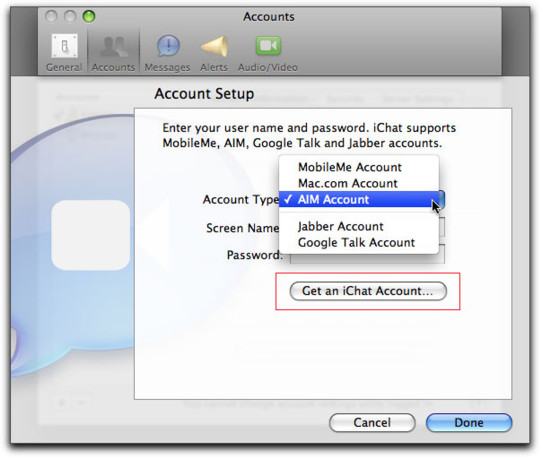
Adversarial interoperability is one of the most reliable ways to protect tech users from predatory corporations: that's when a technologist reverse-engineers an existing product to reconfigure or mod it (interoperability) in ways its users like, but which its manufacturer objects to (adversarial):
https://www.eff.org/deeplinks/2019/10/adversarial-interoperability
"Adversarial interop" is a mouthful, so at EFF, we coined the term "competitive compatibility," or comcom, which is a lot easier to say and to spell.
Scratch any tech success and you'll find a comcom story. After all, when a company turns its screws on its users, it's good business to offer an aftermarket mod that loosens them again. HP's $10,000/gallon inkjet ink is like a bat-signal for third-party ink companies. When Mercedes announces that it's going to sell you access to your car's accelerator pedal as a subscription service, that's like an engraved invitation to clever independent mechanics who'll charge you a single fee to permanently unlock that "feature":
https://www.techdirt.com/2023/12/05/carmakers-push-forward-with-plans-to-make-basic-features-subscription-services-despite-widespread-backlash/
Comcom saved giant tech companies like Apple. Microsoft tried to kill the Mac by rolling out a truly cursèd version of MS Office for MacOS. Mac users (5% of the market) who tried to send Word, Excel or Powerpoint files to Windows users (95% of the market) were stymied: their files wouldn't open, or they'd go corrupt. Tech managers like me started throwing the graphic designer's Mac and replacing it with a Windows box with a big graphics card and Windows versions of Adobe's tools.
Comcom saved Apple's bacon. Apple reverse-engineered MS's flagship software suite and made a comcom version, iWork, whose Pages, Numbers and Keynote could flawlessly read and write MS's Word, Excel and Powerpoint files:
https://www.eff.org/deeplinks/2019/06/adversarial-interoperability-reviving-elegant-weapon-more-civilized-age-slay
It's tempting to think of iWork as benefiting Apple users, and certainly the people who installed and used it benefited from it. But Windows users also benefited from iWork. The existence of iWork meant that Windows users could seamlessly collaborate on and share files with their Mac colleagues. IWork didn't just add a new feature to the Mac ("read and write files that originated with Windows users") – it also added a feature to Windows: "collaborate with Mac users."
Every pirate wants to be an admiral. Though comcom rescued Apple from a monopolist's sneaky attempt to drive it out of business, Apple – now a three trillion dollar company – has repeatedly attacked comcom when it was applied to Apple's products. When Apple did comcom, that was progress. When someone does comcom to Apple, that's piracy.
Apple has many tools at its disposal that Microsoft lacked in the early 2000s. Radical new interpretations of existing copyright, contract, patent and trademark law allows Apple – and other tech giants – to threaten rivals who engage in comcom with both criminal and civil penalties. That's right, you can go to prison for comcom these days. No wonder Jay Freeman calls this "felony contempt of business model":
https://pluralistic.net/2023/11/09/lead-me-not-into-temptation/#chamberlain
Take iMessage, Apple's end-to-end encrypted (E2EE) instant messaging tool. Apple customers can use iMessage to send each other private messages that can't be read or altered by third parties – not cops, not crooks, not even Apple. That's important, because when private messaging systems get hacked, bad things happen:
https://en.wikipedia.org/wiki/2014_celebrity_nude_photo_leak
But Apple has steadfastly refused to offer an iMessage app for non-Apple systems. If you're an Apple customer holding a sensitive discussion with an Android user, Apple refuses to offer you a tool to maintain your privacy. Those messages are sent "in the clear," over the 38-year-old SMS protocol, which is trivial to spy on and disrupt.
Apple sacrifices its users' security and integrity in the hopes that they will put pressure on their friends to move into Apple's walled garden. As CEO Tim Cook told a reporter: if you want to have secure communications with your mother, buy her an iPhone:
https://finance.yahoo.com/news/tim-cook-says-buy-mom-210347694.html
Last September, a 16-year old high school student calling himself JJTech published a technical teardown of iMessage, showing how any device could send and receive encrypted messages with iMessage users, even without an Apple ID:
https://jjtech.dev/reverse-engineering/imessage-explained/
JJTech even published code to do this, in an open source library called Pypush:
https://github.com/JJTech0130/pypush
In the weeks since, Beeper has been working to productize JJTech's code, and this week, they announced Beeper Mini, an Android-based iMessage client that is end-to-end encrypted:
https://beeper.notion.site/How-Beeper-Mini-Works-966cb11019f8444f90baa314d2f43a54
Beeper is known for a multiprotocol chat client built on Matrix, allowing you to manage several kinds of chat from a single app. These multiprotocol chats have been around forever. Indeed, iMessage started out as one – when it was called "iChat," it supported Google Talk and Jabber, another multiprotocol tool. Other tools like Pidgin have kept the flame alive for decades, and have millions of devoted users:
https://www.eff.org/deeplinks/2021/07/tower-babel-how-public-interest-internet-trying-save-messaging-and-banish-big
But iMessage support has remained elusive. Last month, Nothing launched Sunchoice, a disastrous attempt to bring iMessage to Android, which used Macs in a data-center to intercept and forward messages to Android users, breaking E2EE and introducing massive surveillance risks:
https://www.theverge.com/2023/11/21/23970740/sunbird-imessage-app-shut-down-privacy-nothing-chats-phone-2
Beeper Mini does not have these defects. The system encrypts and decrypts messages on the Android device itself, and directly communicates with Apple's servers. It gathers some telemetry for debugging, and this can be turned off in preferences. It sends a single SMS to Apple's servers during setup, which changes your device's bubble from green to blue, so that Apple users now correctly see your device as a secure endpoint for iMessage communications.
Beeper Mini is now available in Google Play:
https://play.google.com/store/apps/details?id=com.beeper.ima&hl=en_US
Now, this is a high-stakes business. Apple has a long history of threatening companies like Beeper over conduct like this. And Google has a long history deferring to those threats – as it did with OG App, a superior third-party Instagram app that it summarily yanked after Meta complained:
https://pluralistic.net/2023/02/05/battery-vampire/#drained
But while iMessage for Android is good for Android users, it's also very good for Apple customers, who can now get the privacy and security guarantees of iMessage for all their contacts, not just the ones who bought the same kind of phone as they did. The stakes for communications breaches have never been higher, and antitrust scrutiny on Big Tech companies has never been so intense.
Apple recently announced that it would add RCS support to iOS devices (RCS is a secure successor to SMS):
https://9to5mac.com/2023/11/16/apple-rcs-coming-to-iphone/
Early word from developers suggests that this support will have all kinds of boobytraps. That's par for the course with Apple, who love to announce splashy reversals of their worst policies – like their opposition to right to repair – while finding sneaky ways to go on abusing its customers:
https://pluralistic.net/2023/09/22/vin-locking/#thought-differently
The ball is in Apple's court, and, to a lesser extent, in Google's. As part of the mobile duopoly, Google has joined with Apple in facilitating the removal of comcom tools from its app store. But Google has also spent millions on an ad campaign shaming Apple for exposing its users to privacy risks when talking to Android users:
https://www.theverge.com/2023/9/21/23883609/google-rcs-message-apple-iphone-ipager-ad
While we all wait for the other shoe to drop, Android users can get set up on Beeper Mini, and technologists can kick the tires on its code libraries and privacy guarantees.

If you'd like an essay-formatted version of this post to read or share, here's a link to it on pluralistic.net, my surveillance-free, ad-free, tracker-free blog:
https://pluralistic.net/2023/12/07/blue-bubbles-for-all/#never-underestimate-the-determination-of-a-kid-who-is-time-rich-and-cash-poor
#pluralistic#multiprotocol#interoperability#adversarial interop#beeper#reverse engineering#blue bubbles#green bubbles#e2ee#end to end encrypted#messaging#jjtech#pypushbeeper mini#matrix#competitive compatibility#comcom
1K notes
·
View notes
Note
Can I ask for a special formatting for this one? It only works in a specific way:
Should Microsoft be dissolved and their patents and copyrights be put in public domain?
-Yes
-Remind me in 3 days
57 notes
·
View notes
Text
Dead AI IoT

Humane AI finally shuts down, HP pays $116m for the pieces — not including the Ai Pin

By David Gerard on 19 February 2025
Humane, creator of the fabulous and literally nonfunctional Ai Pin gadget — that's "Ai," not "AI" — has finally thrown in the towel.
After Humane took $230 million in venture funding and tried and failed to sell itself for $1 billion, Hewlett-Packard is paying $116 million to acqui-hire most of the team and get Humane’s software and patents. [Humane, archive]
There was also some burbling from HP about “an intelligent ecosystem across all HP devices from AI PCs to smart printers and connected conference rooms,” which probably means floundering a bit then selling the software on once again, as they did with Palm and WebOS.
We’re sure that Humane’s venture capital backers — including Sam Altman, Microsoft, and Marc Benioff — will be delighted that minus-50% is now the expected realized return on AI investments in the bubble.
HP is notably not taking on the Ai Pin itself — probably because it’s completely useless and doesn’t work. The hardware overheats and fails, the projected display isn’t visible in sunlight, and the software chains together LLMs to fail to understand or translate conversations. Also, it might catch fire.
The remaining Ai Pins will work until February 28, when the back-end servers at Humane shut down. After that date, you can ... check the battery level? Pretty good for a $700 gadget with a $24/month subscription. We’re sure both customers will be delighted. ]Humane, archive; Humane, archive]
61 notes
·
View notes
Text
A week and a half ago, Goldman Sachs put out a 31-page-report (titled "Gen AI: Too Much Spend, Too Little Benefit?”) that includes some of the most damning literature on generative AI I've ever seen. And yes, that sound you hear is the slow deflation of the bubble I've been warning you about since March. The report covers AI's productivity benefits (which Goldman remarks are likely limited), AI's returns (which are likely to be significantly more limited than anticipated), and AI's power demands (which are likely so significant that utility companies will have to spend nearly 40% more in the next three years to keep up with the demand from hyperscalers like Google and Microsoft). ... I feel a little crazy every time I write one of these pieces, because it's patently ridiculous. Generative AI is unprofitable, unsustainable, and fundamentally limited in what it can do thanks to the fact that it's probabilistically generating an answer. It's been eighteen months since this bubble inflated, and since then very little has actually happened involving technology doing new stuff, just an iterative exploration of the very clear limits of what an AI model that generates answers can produce, with the answer being "something that is, at times, sort of good." It's obvious. It's well-documented. Generative AI costs far too much, isn't getting cheaper, uses too much power, and doesn't do enough to justify its existence. There are no killer apps, and no killer apps on the horizon. And there are no answers.
97 notes
·
View notes
Text
The topic of Palworld is pretty charged, but often times I see people be shamed for liking it because the CEO tweeted stuff about NFTs and the company using AI art in a separate game. Acting as if that's the most damning thing ever for a gaming company in an industry filled with similar people.
Make no mistake, I dislike both AI art and nfts, but do you realize how many gaming companies have involvement with that?
To begin with, Pokémon used AI art in a promotional piece for Pokémon Go in September, and nobody gave a shit because uwu Pikachu. The Pokémon Company also put a job listing some months back seeking an expert in NFTs. That's not quite damning evidence, but if I were a betting man, no "NFT expert" will willingly say "yeah nfts suck are bad for the environment, man, I'll take my paycheck and fuck off now." There's also a strong argument to be made that Pokémon has stolen ideas from fakemon artists (Finizen and Palafin, Scovillain, Dipplin, etc) and other franchises (kaiju movies, Dragon Quest, Megaman, final fantasy, western cartoons and food mascots, etc), a dubious legal statement that claims they own all fan art from the remixes and fakemon made on youtube to the pikachu your kid drew at breakfast; they have yet to apologize for the state of Scarlet and Violet while charging full price to millions of paying customers for a clearly unfinished and barely functioning game (which i did enjoy, but you can't tell me it was finished baking when it struggles not to shit itself just to run), and a bunch of other things people shit on Palworld for, but A. It's Pokémon so people don't care and think it's fine, and B. That's not the point of this post.
You know who else does NFTs and AI art? (Yes I heard Muscle Man from Regular Show in my head just now, too, moving along)
Square Enix sold several of their IPs for NFTs and claims to have used AI art "a minimum amount" in Foam Stars, yet I see nobody yelling for boycotts of Final Fantasy 14, 16, Kingdom Hearts, Dragon Quest, Life is Strange, etc etc etc.
Sony has invested in both, they want to implement AI into gaming, and has a patent for nfts to be used in games and consoles, yet there's no movement to throw out your playstations.
Bandai Namco- you know, that company with a hand in pretty much most anime games on the market and popular games such as the Dark Souls games? They have a game called RYU that's essentially a virtual pet game that uses the blockchain, and its AI driven, among other projects. Yet there's no outcry to stop playing the many, MANY games they brand with. This also includes quite a few Nintendo games (btw they just partnered together to form a special studio quite recently) like Smash Wii U/3ds and New Pokémon Snap. Nobody gives a shit though.
Android, Microsoft, Google, Apple- I don't even need to explain those, they have whole teams dedicated to both. Even popular VPN companies accept crypto.
I'm just saying an awful lot of you guys that scream and shit bloody murder about Palworld's company being involved with that shit are either the biggest "It's okay when my favs do it" type of hypocrites, or you're sorely ignorant to just how evil and greedy most corporations are. You'll be hard pressed to find a game company with popular AND fun games that DOESN'T have some interest in either, let alone movie and show studios. That's the awful reality we live in.
You have 2 options
1. You basically stop doing anything involving most modern tech, including throwing out your pc and smart phone. You could probably live a comfortable life with tech circa 2010, but you have to be aware that any thing you buy may go towards a cause you don't like.
2. You accept that people can enjoy a product while not necessarily agreeing with the CEO of said product. Most CEOs tend to be jackasses anyway, that's kind of the shared trait they all have. You can also discourage companies from using them while understanding it is everywhere.
Palworld at the end of the day is just a toy, that's it. From the looks of it, it's not even actually hurting anyone, and it seems like the company at least treats their employees pretty decently- at least according to a few things I've seen here and there that seems rather progressive for a Japanese studio (with room for doubt obviously, it's a company after all and as we've established, they're all evil). At the least its not like when people supported Hogwarts Legacy and directly put money into JKR's wallet so she can openly hurt more Trans women. In fact, the only people seemingly hurt in all of this Palworld drama are obsessed Pokémon stans that can't accept a parody, or the Pokémon Company themselves, who rightly deserve some punching up tbh.
You can just say you dislike the game, that's fine, I totally get that. Even though I personally think The Pokémon Company deserves a few nut shots after the way they've treated fans these last few years with the state of their games (and you know, stealing ideas from fans without credit), I can see why someone would be turned away from a parody that's literally meant to be Pokémon with guns. I can totally understand all of that, personally I'd prefer if the game was MORE like Pokémon with turn based combat.
But if you're going to defend Pokémon because you think its perfectly innocent because of Wooloo or something like that, just be sure you're aware you're defending the World's Richest Franchise and their own attempts at AI and NFTs while calling out an indie company (a real one thats learning as they go, not the fake "We're totally indie" franchise that hasn't been indie since gen 3) for having a ceo that also seems interested in the same stuff. And remember, you don't become number 1 without hurting people somehow (we could dig up receipts about certain partners Pokémon has teamed up with, such as Tencent with Unite, but I'd rather not right now.)
Just saying. I don't think you're an irredeemable person for still liking Pikachu, cuz I do too believe it or not. I've been a life long fan and still have fun with the games despite the clear scummy business practices towards their paying customers. Just maybe extend that courtesy to the millions of players just trying to have fun in this awful, putrid, shithole planet that just keeps getting worse and worse with each passing day.
Plus... you know, think about it. Do you think Pokémon would ever get around to making a gunless Palworld? Probably not. Do you think Palworld would exist if The Pokémon Company and Nintendo were the slightest bit chill about Pokémon fan projects like SEGA is with Sonic? Also probably not. From what I've read, the devs just wanted to make a fun game that happens to mostly be ARK with Pokémon adjacent monsters. That's not really a bad thing, all things considered, and it seems like the worst they've done is reference official Pokémon when making their own models.
Palworld being successful is actually beneficial to Pokémon fans, as well. It'll never really truly compete, but it has outsold Legends Arceus in terms of units sold (not as much financially because Palworld was only $30 plus a sale recently, but still impressive), and it is enough that Game Freak is aware of its existence. Let Palworld light a fire under their ass, and maybe GF will actually finish their next game before releasing it for full price (and no, we're not bringing up the tired imaginary ball and chain game devs, game freak owns 1/3rd lf the franchise and can easily take methods to get more dev time, they just haven't because money). Just saying, at least the Paldevs were honest enough to sell it in early access for half the price.
96 notes
·
View notes
Text

Democratic presidential candidate Robert F. Kennedy, Jr. said that climate-related issues are being “exploited” by wealthy individuals in a bid to enact “totalitarian controls” over society.
“Climate issues and pollution issues are being exploited by … mega billionaires” like Microsoft co-founder Bill Gates, Kennedy told radio host Kim Iversen over the past weekend. “The same way that COVID was exploited to use it as an excuse to clamp down top-down totalitarian controls on society and then to give us engineering solutions.”
“And if you look closely, as it turns out, the guys who are promoting those engineering solutions are the people who own … the patents for those solutions,” Kennedy said during Iversen’s show.
“It’s a way they’ve given climate chaos a bad name because people now see that it’s just another crisis that’s being used to strip mine the wealth of the poor and to enrich billionaires.”
#nothing can stop what is coming#when you know you know#no rest for the wicked#wwg1wga#gitmo tribunals
279 notes
·
View notes
Text
the thing about Linux is
some things are hard because they require different skills (command line stuff)
some things are hard because the UI is legitimately straight up worse (some things related to packaging)
some things are hard because Linux has dozens of distributions and not just one (other things related to packaging, the GTK vs Qt nonsense kinda)
some things are hard because hardware manufacturers are incompetent, but if you can't ship on Windows you can't ship at all and so they work with Microsoft to fix their incompetence
some things are hard because closed-source developers actively don't want third parties working with them (MP3 support prior to patent expiration, Microsoft Word compat)
and in many cases you already have to be very Linux to know which case you're in
50 notes
·
View notes
Text
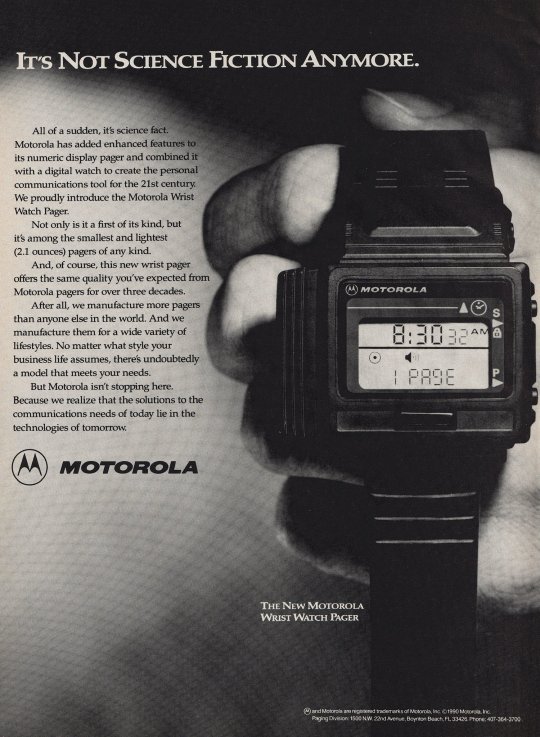
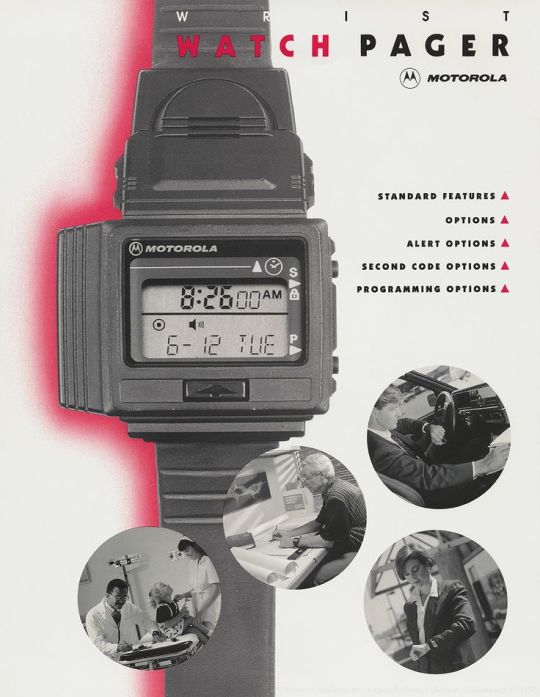


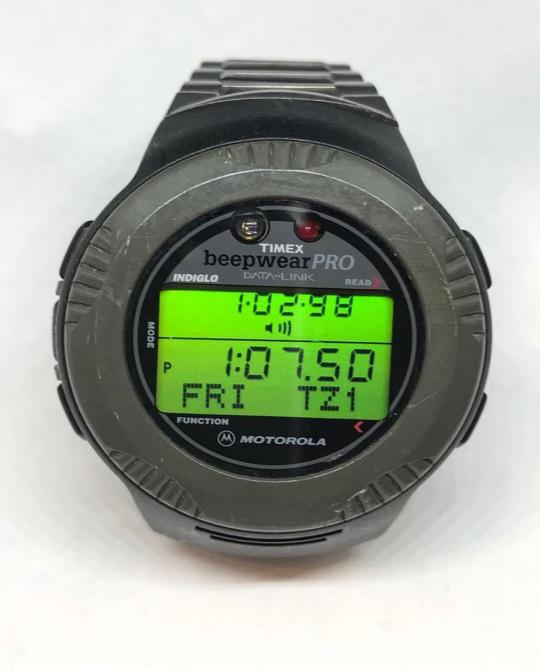
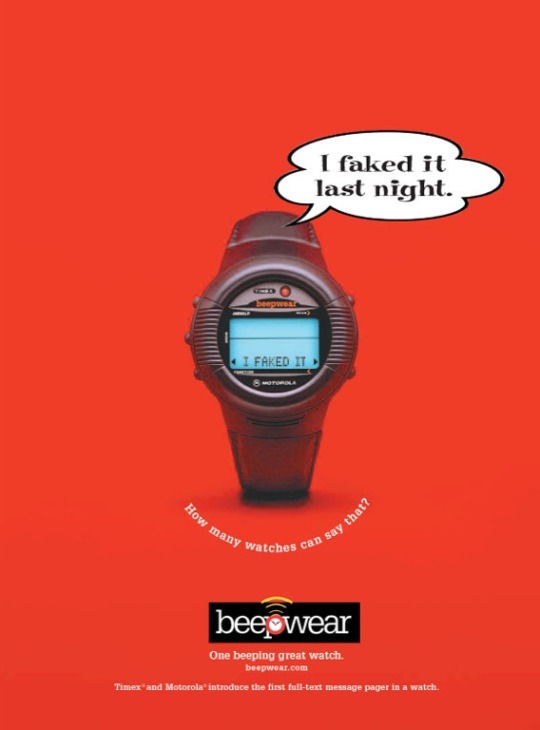

🇺🇲 Explore the Fascinating Fusion of Timekeeping and Communication: Unveiling the Pioneering Motorola and Timex Wristwatch-Pagers that Revolutionized Wearable Technology in the 1990s.
🤝 In 1990, Motorola Inc. made its first attempt to enter the market of electronic wristwatches with a built-in pager (similar devices at the same time were already produced by the Japanese companies Seiko and Casio). The device was called "Motorola Wrist Wach Pager". Since 1991, further production of the devices has been carried out jointly with the Timex Group Corporation under the name "The Timex Tracer Wrist Watch Pager".
👉 Since 1998, further development of the line of electronic watches with the participation of Motorola Inc. and Timex Group was associated with the high-tech "Timex Beepwear Datalink" series. These devices also continued the concept of wristwatch-pagers, but with the integration of the well-known Datalink data transmission platform, which integrates with desktop computer software.
➡️ The Datalink line was introduced in 1994 and was developed in conjunction with Microsoft Corporation as an alternative to conventional PDAs with added attributes such as water resistance and ease of programming. Taken together, all this made it possible to use the “Beepwear Datalink” watch as a full-fledged electronic organizer.
📟 The Beepwear Pager Watch epitomized the convergence of traditional wristwatches with cutting-edge communication capabilities. Introduced in the late 1990s, this innovative device redefined the concept of wearable tech, offering users unparalleled convenience and connectivity on the go.
📞 Equipped with pager functionality, the Beepwear Pager Watch allowed users to receive important notifications and messages directly on their wrist, eliminating the need for separate communication devices. With its sleek and compact design, it seamlessly integrated into everyday life, providing instant access to critical information wherever you went.
⌚️ Beyond its communication features, the Beepwear Pager Watch retained the timeless appeal of a classic timepiece, boasting a stylish and durable design that stood the test of time. With its reliable quartz movement and rugged construction, it was built to withstand the rigors of daily wear, ensuring longevity and reliability for its users.
⚙️ The "Beepware" series, as a joint product of the efforts of Timex Group and Motorola Inc. was patented, and the production of the devices was carried out by the newly created joint company "Beepwear Paging Products". The clock operated in the 900 MHz band. FLEX time was also used, which, if supported by the operator, could synchronize the clock time with the network time, and also automatically adjust to the owner's time zone.
🚀 The launch of the Timex Motorola Beepwear Pager Watch marked a significant milestone in the evolution of wearable technology, showcasing the potential for seamless integration of communication and timekeeping functions in a single device. As one of the pioneering products in this category, it paved the way for future innovations in the wearable tech industry, inspiring a new generation of smartwatches and wearable devices.
💔 However, already in 2002, Motorola Inc. was forced to carry out internal restructuring, including ceasing production and support of its own pagers.
💫 Today, the legacy of the Timex Motorola Beepwear Pager Watch lives on, remembered as a trailblazer in the realm of wearable technology. While newer devices may offer more advanced features, the Beepwear Pager Watch remains a symbol of innovation and ingenuity, reminding us of the transformative power of technology in shaping our lives.
#timetrek#brands#clock#watch#watches#time#companies#company#history#luxury watches#motorola#timex group#timex watches for men#timex#beepwear#pager#wristwatch#wrist watch#wristwatch pda#wristwatch pager#datalink#microsoft#smartwatch#digital watch#casio#seiko#made in usa#telecommunications#innovation#old gadgets
27 notes
·
View notes
Text

Robert Frederick Smith (December 1, 1962) is a businessman, philanthropist, chemical engineer, and investor. He is the Founder, Chairman, and CEO of private equity firm Vista Equity Partners.
In high school, he applied for an internship at Bell Labs but was told the program was intended for college students. He persisted, calling each Monday for five months. When a student from M.I.T. did not show up, he got the position, and that summer he developed a reliability test for semiconductors. He earned a BS in chemical engineering from Cornell University. He became a brother of Alpha Phi Alpha. He received his MBA from Columbia University with concentrations in finance and marketing.
He worked at Goodyear Tire and Rubber Company, Air Products & Chemicals, and Kraft General Foods as a chemical engineer, where he registered two US and two European patents. He worked for Goldman Sachs in technology investment banking, first in New York City and then in Silicon Valley. He advised on mergers and acquisition activity with companies such as Apple and Microsoft. He was included in Vanity Fair’s New Establishment List, which is an annual ranking of individuals who have made impactful business innovations.
He founded Vista Equity Partners, a private equity and venture capital firm of which he is the principal founder, chairman, and chief executive. He is credited with generating a 30 percent rate of return for his investors from the company’s inception to 2020. Vista Equity Partners was the fourth largest enterprise software company after Microsoft, Oracle, and SAP, including all their holdings. Vista has invested in companies such as STATS, Ping Identity, and Jio. Vista Equity Partners had closed more than $46 billion of funding.
He was named Private Equity International’s Game Changer of the Year for his work with Vista.
The 2019 PitchBook Private Equity Awards named Vista Equity Partners “Dealmaker of the Year”. #africanhistory365 #africanexcellence #alphaphialpha
9 notes
·
View notes
Text
The US Patent and Trademark Office banned the use of generative artificial intelligence for any purpose last year, citing security concerns with the technology as well as the propensity of some tools to exhibit “bias, unpredictability, and malicious behavior,” according to an April 2023 internal guidance memo obtained by WIRED through a public records request. Jamie Holcombe, the chief information officer of the USPTO, wrote that the office is “committed to pursuing innovation within our agency” but are still “working to bring these capabilities to the office in a responsible way.”
Paul Fucito, press secretary for the USPTO, clarified to WIRED that employees can use “state-of-the-art generative AI models” at work—but only inside the agency’s internal testing environment. “Innovators from across the USPTO are now using the AI Lab to better understand generative AI's capabilities and limitations and to prototype AI-powered solutions to critical business needs,” Fucito wrote in an email.
Outside of the testing environment, USPTO staff are barred from relying on AI programs like OpenAI’s ChatGPT or Anthropic’s Claude for work tasks. The guidance memo from last year also prohibits the use of any outputs from the tools, including images and videos generated by AI. But Patent Office employees can use some approved AI programs, such as those within the agency’s own public database for looking up registered patents and patent applications. Earlier this year, the USPTO approved a $75 million contract with Accenture Federal Services to update its patent database with enhanced AI-powered search features.
The US Patent and Trademark Office, an agency within the Department of Commerce, is in charge of protecting inventors, awarding patents, and registering trademarks. It also “advises the president of the United States, the secretary of commerce, and US government agencies on intellectual property (IP) policy, protection, and enforcement,” according to the USPTO’s website.
At a Google-sponsored event in 2023, Holcombe, the author of the guidance memo, said government bureaucracy makes it difficult for the public sector to use new technologies. “Everything we do in the government is pretty stupid, when you compare it to the commercial world, right?” he said. Holcombe specifically cited cumbersome budgeting, procurement, and compliance processes, arguing that they hamper the government's ability to rapidly adopt innovations like artificial intelligence.
The USPTO is not the only government agency to ban staff from using generative AI, at least for some purposes. Earlier this year, the National Archives and Records Administration prohibited the use of ChatGPT on government-issued laptops, according to 404 Media. But soon afterward, the National Archives hosted an internal presentation that encouraged employees to “think of [Google’s] Gemini as a co-worker.” During the meeting, some archivists reportedly expressed concerns about the accuracy of generative AI. Next month, the National Archives is planning to release a new public chatbot for accessing archival records developed with technology from Google.
Other US government agencies are using—or avoiding—generative AI in different ways. The National Aeronautics and Space Administration, for example, specifically banned the use of AI chatbots for sensitive data. NASA did decide, however, to experiment with the technology for writing code and summarizing research. The agency also announced last week that it’s working with Microsoft on an AI chatbot that can aggregate satellite data to make it easily searchable. That tool is available only to NASA scientists and researchers, but the goal is to “democratize access to spaceborne data.”
9 notes
·
View notes
Note
nobody should own patents on anything because ownership of ideas is bad for creative dialogue as a whole. Nintendo getting to shit on any indie company they like is objectively awful
You do know that patents also help small companies prevent their ideas and concepts from being stolen by bigger companies that could, very easily, do what that small company or person does and put them out of business... right?
Like that's kinda the point.
Medicine should not be able to be patented. That's straight up bullshit and kills people year over year.
But this isn't that. This is something entirely different.
Also at what point does a company go from being indie to not indie? PocketPair has repeatedly mentioned that they've made "MORE MONEY THAN THEY KNOW WHAT TO DO WITH" and have had Microsoft directly supporting their team for a while now, and they were a huge push from PlayStation's State of Play from yesterday.
PocketPair has also had various of their titles called scams from the gaming community at large because they sold people on one thing and delivered something entirely different IF they delivered anything at all.
Saying "Nintendo is big and dumb and evil" is not a talking point and isn't the compelling argument you think you're making.
Yes. Nintendo is big. Yes. Nintendo can be imposing. Yes. All major companies are basically evil in a lot of ways. Literally no one is saying "Nintendo is our friend and they love us!" that has nothing to do with what the issues being brought up are.
Being able to protect your work, your art, your craft, and your skill from being poached by other people without proper credit or pay to you is a pretty big deal. And if NINTENDO isn't able to protect themselves with it YOU definitely won't.
53 notes
·
View notes